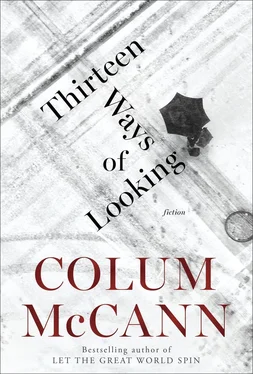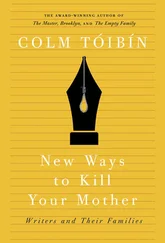She pulled a swimming cap hard over her hair and yanked the zip tight on her wetsuit. The teeth of it were stiff.
Rebecca waded in, dove. The cold pierced her. Her arms rose and rose again. She stopped, glanced back, forced herself onward. Her shoulder ached. She saw his face at every stroke: the dark hood, his blond hair, his blue eyes.
Out past the seastack, she moved along the coast, the sound of the waves in her ears, another deafness, the blood receding from her fingers, her toes, her mind.
—
A NOVELLA HAD ARRIVED from the publisher in Tel Aviv eight months before, a beautifully written story by an Arab Israeli from Nazareth: an important piece of work, she thought.
She had begun immediately to translate it, the story of a middle-aged couple who had lost their two children. She had come upon the word sh’khol. She cast around for a word to translate it but there was no proper match. There were words, of course, for widow, widower, and orphan, but no noun, no adjective, for a parent who had lost a child. None in Irish, either. She looked in Russian, in French, in German, in other languages, too, but could find analogues only in Sanskrit, vilomah, and in Arabic, thakla, a mother, mathkool, a father. Still none in English. It had bothered her for days. She wanted to be true to the text, to identify the invisible, torn open, ripped apart, stolen . In the end she had settled upon the formal bereaved, not precise enough, she thought, no mystery in it, no music, hardly a proper translation at all, bereaved .
—
IT WAS ALMOST NOON when she was yanked in by the neck of her wetsuit. A coast-guard boat. Four men aboard. She fell to the deck, face to the slats, gasping. They carried her down to the cabin. Leaned over her. A mask. Tubes. Their faces: blurry, unfocused. Their voices. Oxygen. A hand on her brow. A finger on her wrist. The weight of water still upon her. Her teeth chattered. She tried to stand.
— Let me back, she pleaded.
The cold burned inside her. Her shoulder felt as if it had been ripped from its socket.
— Sit still now, you’ll be all right. Just don’t move.
They wrapped her in silver foil blankets, massaged her fingers and toes, slapped her twice across the cheek, gently, as if to wake her.
— Mrs. Barrington. Can you hear me?
In the blue of the skipper’s eyes she saw Tomas appear, disappear. She touched his face, but the beard bristled against her hand.
The skipper spoke to her in English first, then Irish, a sharpness to his tone. Was she sure Tomas had gone swimming? Was there any other place he might be? Had he ever done this before? What was he wearing? Did he have a phone? Did he have any friends along the coast?
She tried to stand once more, but the skipper held her back.
The wind buffeted the cabin windows, whitened the tops of the waves. A few gulls darted acrobatically above the water. Rebecca glanced at the maritime maps on the wall, enormous charts of line and color. A furnace of grief rose up in her. She peered out past the stern, the widening wake. The radio crackled: a dozen different voices.
She was making the sounds, she knew, of an animal.
The boat slowed suddenly, pulled into a slipway. A fine shiver of spray stung her face. She did not recognize the area. A lamplight was still shining in the blue daytime. A faint glow, a prospect of dark. Onlookers huddled by their cars, pointing in her direction. Beams of red and blue slashed the treetops. Rebecca felt a hand at her shoulder. The skipper escorted her along the pier. One of her blankets slipped away. She was immediately aware of her wetsuit: the tightness, the darkness, the cold. A series of whispers. She was struck by the immense stillness, the silence, not a breath of wind.
She turned, broke free and ran. Sh’khol.
When they pulled her from the water a second time, she saw a man hurrying toward her with his cell phone, watching the screen as he filmed her rising from the low, gray waves. He carried the phone like an accusation: she would, she knew, be on the Internet later that night.
— Tomas, she whispered as they put her in the car.
At home, a sedative dulled her. A policewoman sat in a corner of the room, silent, watching, a teacup and saucer in her hands. Through the large plate-glass window Rebecca could see figures wandering about, casting backward glances. One of them appeared to be scribbling in a notebook.
The Gardaí had set up in the living room. Every few moments another phone rang. Cars turned in the narrow laneway outside the cottage, their tires crunching on the gravel.
Somebody was smoking outside. She could smell a rag of it moving through the house. She rose to shut the bedroom window. Something has ended, she thought. Something has finished. She could not locate the source of the feeling.
She paused a moment and strode across the floor toward the bedroom. The policewoman uncrossed her legs but did not rise from the wicker chair. Rebecca strode out. The living room fell quiet, except for the static of a police radio. A wine bottle on the table. A discarded party hat. The scraps of their Christmas dinner heaped in the sink, swollen with dishwater.
— I want to join the search parties.
— It’s best for you to stay here.
— He can’t hear the whistles, he’s deaf.
— Best stay in the cottage, Mrs. Barrington.
She felt as if she had chewed a piece of aluminum, the pain in her head suddenly cold.
— Marcus. My name is Marcus. Rebecca Marcus.
She pushed open the door of Tomas’s room. Two plainclothes police were sifting through his cupboard drawers. On his bed was a small plastic bag marked with a series of numbers: strands of hair inside. Thin and blond. The detectives turned to her.
— I’d like to get his pajamas, she said.
— I’m sorry, Miss. We can’t let you take anything.
— His jammies, that’s all I want.
— A question. If you don’t mind.
As the detective approached, she could smell the remnants of cinnamon on him, some essence of Christmas. He struck the question sharply, like a match against her.
— How did you get that bruise?
Her hand flew to her face. She felt as if some jagged shape had been drawn up out of her, ripping the roof of her mouth.
Outside, the early dark had taken possession of everything.
— No idea, she said.
A woman alone with a boy. In a western cottage. Empty wine bottles strewn about. She looked over her shoulder: the other guards were watching from the living room. She heard the rattle of pills from the bathroom. An inventory of her medicine. Another was searching her bookshelves. The Iron Mountains. Factory Farming. Kaddish. House Beautiful. The Remains of the Day. So, she was under suspicion. She felt suddenly marooned. Rebecca drew herself to full height and walked back toward the living room.
— Ask that person outside to please stop smoking, she said.
—
HE CAME DOWN THE LANEWAY, beeping the car horn, lowered the window, beckoned the guard over: I’m the child’s father .
Alan had lost the jowls of his occasional drinking. The thinness made him severe. She tried to look for the old self that might remain, but he was clean-shaven, and there was something so deeply mannered about him, a tweed jacket, a thin tie pushed up against his neck, a crease in his slacks. He looked as if he had dressed himself in the third person.
He buried his face in Tomas’s duffle by the door, then sank theatrically to his knees, but was careful to wipe the muck when he rose and followed her to her bedroom.
The policewoman in the corner stood up, gave a nervous smile. Rebecca caught a glance at herself in the full-length mirror: swollen, disheveled. Alan paced the room.
Читать дальше












